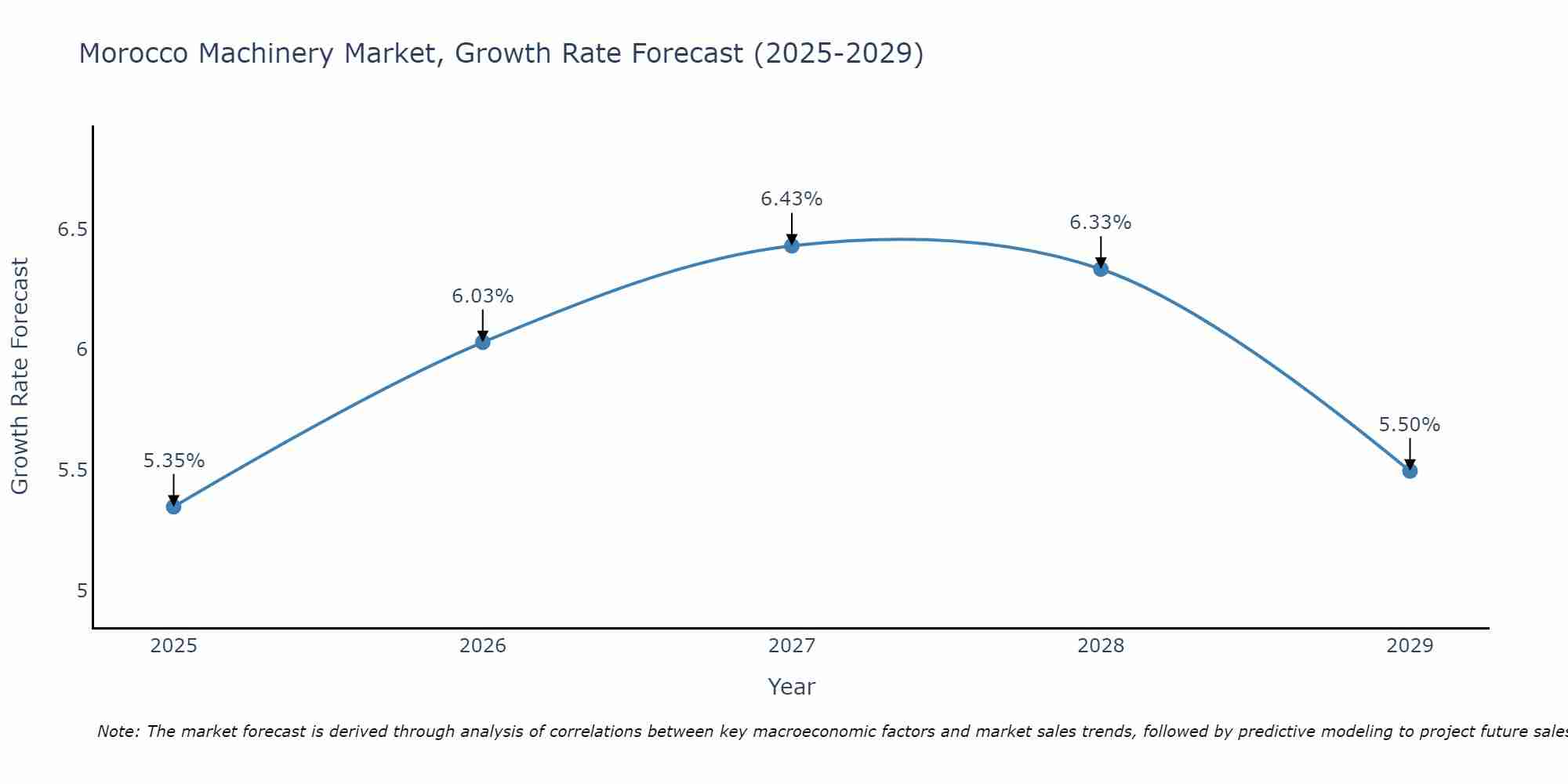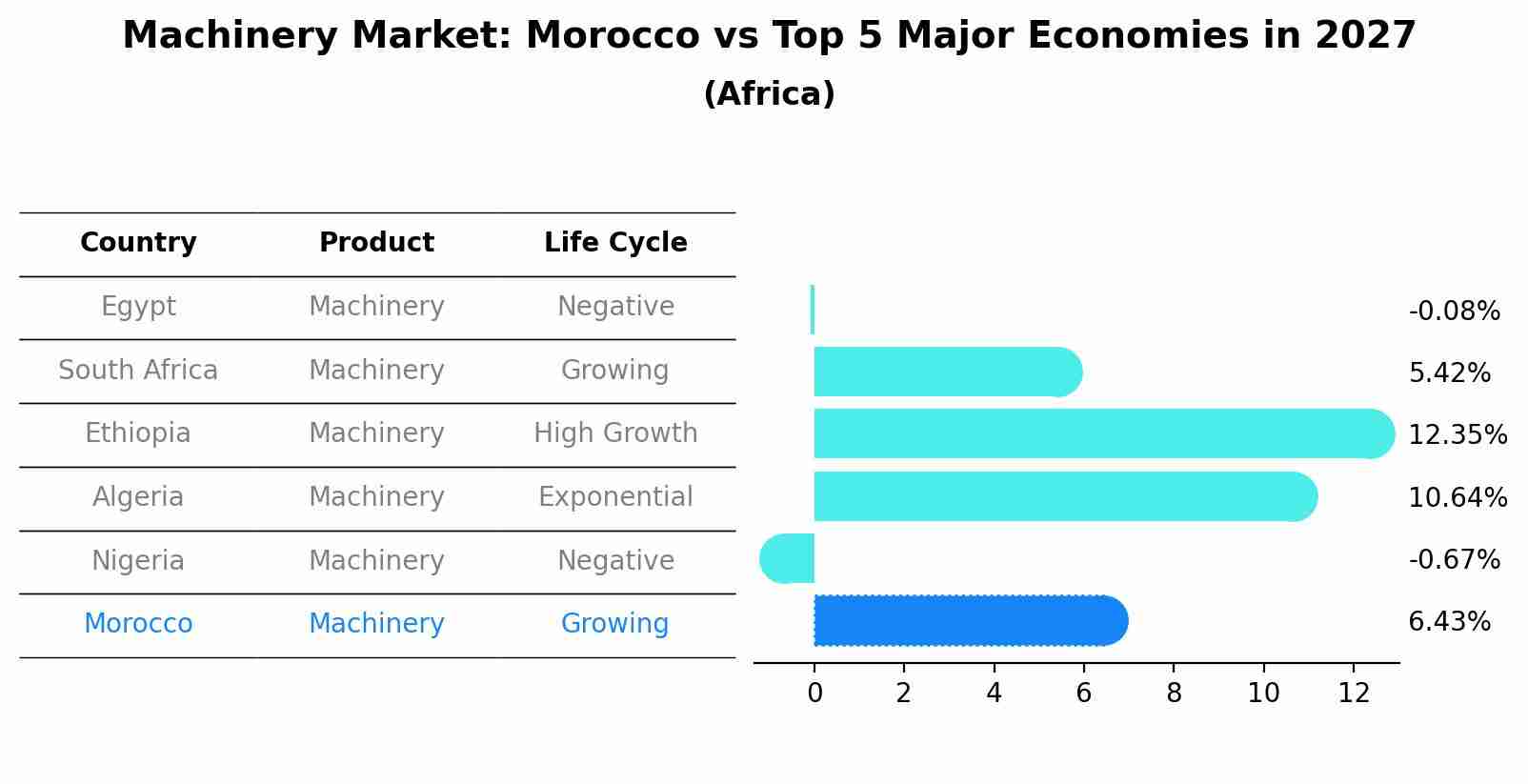Morocco Machinery Market Outlook | Growth, Trends, Companies, Revenue, Forecast, Analysis, Value, Industry, Share, Size & COVID-19 IMPACT
| Product Code: ETC433189 | Publication Date: Oct 2022 | Updated Date: Jul 2025 | Product Type: Market Research Report | |
| Publisher: 6Wresearch | Author: Bhawna Singh | No. of Pages: 75 | No. of Figures: 35 | No. of Tables: 20 |
Morocco Machinery Market Size Growth Rate
The Morocco Machinery Market is projected to witness mixed growth rate patterns during 2025 to 2029. Starting at 5.35% in 2025, the market peaks at 6.43% in 2027, and settles at 5.50% by 2029.

Machinery Market: Morocco vs Top 5 Major Economies in 2027 (Africa)
Morocco's Machinery market is anticipated to experience a growing growth rate of 6.43% by 2027, reflecting trends observed in the largest economy Egypt, followed by South Africa, Ethiopia, Algeria and Nigeria.

Morocco Machinery Market Synopsis
The Morocco machinery market is witnessing steady growth driven by increasing industrialization and infrastructure development in sectors such as agriculture, construction, and manufacturing. The demand for machinery and equipment is rising as businesses seek to enhance productivity and efficiency. Key segments include agricultural machinery, construction equipment, industrial machinery, and power generation equipment. The market is characterized by both domestic manufacturers and international players offering a wide range of products. Government initiatives to promote local manufacturing and foreign investments in the machinery sector are further fueling market growth. However, challenges such as limited access to financing and import restrictions impact market dynamics. Overall, the Morocco machinery market presents opportunities for companies to expand their presence and cater to the evolving needs of various industries.
Morocco Machinery Market Trends
In Morocco, the machinery market is experiencing a growing demand for advanced technologies and automation solutions across various industries such as agriculture, construction, and manufacturing. Companies are increasingly investing in machinery to improve efficiency, productivity, and competitiveness. There is a notable trend towards environmentally friendly and energy-efficient machinery to align with sustainability goals and regulations. Additionally, the rise of digitalization and the Internet of Things (IoT) is influencing the development of smart machinery that can optimize operations and provide real-time data for informed decision-making. The market is also seeing a shift towards rental and leasing options as businesses look for cost-effective ways to access the latest machinery without high upfront investments. Overall, the Morocco machinery market is evolving towards innovation, sustainability, and efficiency.
Morocco Machinery Market Challenges
In the Morocco machinery market, several challenges are prevalent. One major challenge is the limited access to advanced technology and machinery due to high import costs and tariffs, which hinder the modernization and efficiency of local industries. Additionally, the lack of skilled workforce and technical expertise poses a significant obstacle in the adoption and maintenance of sophisticated machinery. Infrastructure limitations, such as inadequate transportation networks and power supply, further restrict the growth and competitiveness of the machinery market in Morocco. Moreover, the regulatory environment and bureaucratic procedures can be cumbersome and time-consuming, impacting the ease of doing business and investment in the sector. Overall, addressing these challenges through targeted policies and investments is crucial to unlocking the full potential of the machinery market in Morocco.
Morocco Machinery Market Investment Opportunities
In the Morocco Machinery Market, there are several promising investment opportunities across various sectors. Agriculture machinery is in high demand due to the country`s focus on modernizing its agricultural practices, presenting opportunities for companies specializing in tractors, irrigation systems, and harvesting equipment. Additionally, the construction industry in Morocco is growing, creating a need for construction machinery such as excavators, cranes, and bulldozers. Renewable energy projects are also on the rise, driving the demand for machinery used in the production of solar panels and wind turbines. With the government`s emphasis on industrial development and infrastructure projects, investing in machinery related to manufacturing and transportation sectors could also prove to be lucrative in the Moroccan market.
Jordan Agar Market Government Policies
The Moroccan government has implemented various policies to support the machinery market in the country. These include initiatives to promote local manufacturing and assembly of machinery to reduce dependency on imports, as well as efforts to attract foreign investment in the sector. Additionally, the government offers incentives such as tax breaks, subsidies, and training programs to support machinery manufacturers and create a favorable business environment. Furthermore, there are regulations in place to ensure compliance with quality and safety standards, aiming to enhance the competitiveness of Moroccan machinery products in both domestic and international markets. Overall, these policies demonstrate the government`s commitment to developing and strengthening the machinery market in Morocco.
Morocco Machinery Market Future Outlook
The future outlook for the Morocco Machinery Market appears to be promising, driven by increasing industrialization, infrastructure development projects, and government initiatives to boost the manufacturing sector. The country`s strategic location as a gateway to Africa and its growing focus on sectors like automotive, agriculture, and renewable energy are expected to drive demand for machinery and equipment. Additionally, the rising adoption of advanced technologies such as automation, digitization, and robotics is likely to fuel growth in the market. However, challenges such as fluctuating raw material prices, economic uncertainties, and competition from international players may pose some hurdles. Overall, with continued investments and favorable government policies, the Morocco Machinery Market is anticipated to show steady growth in the coming years.
Key Highlights of the Report:
- Morocco Machinery Market Outlook
- Market Size of Morocco Machinery Market, 2021
- Forecast of Morocco Machinery Market, 2031
- Historical Data and Forecast of Morocco Machinery Revenues & Volume for the Period 2018 - 2031
- Morocco Machinery Market Trend Evolution
- Morocco Machinery Market Drivers and Challenges
- Morocco Machinery Price Trends
- Morocco Machinery Porter's Five Forces
- Morocco Machinery Industry Life Cycle
- Historical Data and Forecast of Morocco Machinery Market Revenues & Volume By Type for the Period 2018 - 2031
- Historical Data and Forecast of Morocco Machinery Market Revenues & Volume By Agriculture, Construction, And Mining Machinery for the Period 2018 - 2031
- Historical Data and Forecast of Morocco Machinery Market Revenues & Volume By Industrial Machinery for the Period 2018 - 2031
- Historical Data and Forecast of Morocco Machinery Market Revenues & Volume By Commercial And Service Industry Machinery for the Period 2018 - 2031
- Historical Data and Forecast of Morocco Machinery Market Revenues & Volume By Ventilation for the Period 2018 - 2031
- Historical Data and Forecast of Morocco Machinery Market Revenues & Volume By Heating for the Period 2018 - 2031
- Historical Data and Forecast of Morocco Machinery Market Revenues & Volume By Air-Conditioning for the Period 2018 - 2031
- Historical Data and Forecast of Morocco Machinery Market Revenues & Volume By Commercial Refrigeration Equipment for the Period 2018 - 2031
- Historical Data and Forecast of Morocco Machinery Market Revenues & Volume By Distribution Channel for the Period 2018 - 2031
- Historical Data and Forecast of Morocco Machinery Market Revenues & Volume By Supermarkets/Hypermarkets for the Period 2018 - 2031
- Historical Data and Forecast of Morocco Machinery Market Revenues & Volume By Convenience Stores for the Period 2018 - 2031
- Historical Data and Forecast of Morocco Machinery Market Revenues & Volume By E-Commerce for the Period 2018 - 2031
- Historical Data and Forecast of Morocco Machinery Market Revenues & Volume By Others for the Period 2018 - 2031
- Historical Data and Forecast of Morocco Machinery Market Revenues & Volume By Others for the Period 2018 - 2031
- Historical Data and Forecast of Morocco Machinery Market Revenues & Volume By Nature for the Period 2018 - 2031
- Historical Data and Forecast of Morocco Machinery Market Revenues & Volume By Organic for the Period 2018 - 2031
- Historical Data and Forecast of Morocco Machinery Market Revenues & Volume By Conventional for the Period 2018 - 2031
- Morocco Machinery Import Export Trade Statistics
- Market Opportunity Assessment By Type
- Market Opportunity Assessment By Distribution Channel
- Market Opportunity Assessment By Nature
- Morocco Machinery Top Companies Market Share
- Morocco Machinery Competitive Benchmarking By Technical and Operational Parameters
- Morocco Machinery Company Profiles
- Morocco Machinery Key Strategic Recommendations
Frequently Asked Questions About the Market Study (FAQs):
Export potential assessment - trade Analytics for 2030
Export potential enables firms to identify high-growth global markets with greater confidence by combining advanced trade intelligence with a structured quantitative methodology. The framework analyzes emerging demand trends and country-level import patterns while integrating macroeconomic and trade datasets such as GDP and population forecasts, bilateral import–export flows, tariff structures, elasticity differentials between developed and developing economies, geographic distance, and import demand projections. Using weighted trade values from 2020–2024 as the base period to project country-to-country export potential for 2030, these inputs are operationalized through calculated drivers such as gravity model parameters, tariff impact factors, and projected GDP per-capita growth. Through an analysis of hidden potentials, demand hotspots, and market conditions that are most favorable to success, this method enables firms to focus on target countries, maximize returns, and global expansion with data, backed by accuracy.
By factoring in the projected importer demand gap that is currently unmet and could be potential opportunity, it identifies the potential for the Exporter (Country) among 190 countries, against the general trade analysis, which identifies the biggest importer or exporter.
To discover high-growth global markets and optimize your business strategy:
Click Here- Single User License$ 1,995
- Department License$ 2,400
- Site License$ 3,120
- Global License$ 3,795
Search
Thought Leadership and Analyst Meet
Our Clients
Related Reports
- Saudi Arabia Car Window Tinting Film, Paint Protection Film (PPF), and Ceramic Coating Market (2025-2031) | Strategy, Consumer Insights, Analysis, Investment Trends, Opportunities, Growth, Size, Share, Industry, Revenue, Segments, Value, Segmentation, Supply, Forecast, Restraints, Outlook, Competition, Drivers, Trends, Demand, Pricing Analysis, Competitive, Strategic Insights, Companies, Challenges
- South Africa Stationery Market (2025-2031) | Share, Size, Industry, Value, Growth, Revenue, Analysis, Trends, Segmentation & Outlook
- Afghanistan Rocking Chairs And Adirondack Chairs Market (2026-2032) | Size & Revenue, Competitive Landscape, Share, Segmentation, Industry, Value, Outlook, Analysis, Trends, Growth, Forecast, Companies
- Afghanistan Apparel Market (2026-2032) | Growth, Outlook, Industry, Segmentation, Forecast, Size, Companies, Trends, Value, Share, Analysis & Revenue
- Canada Oil and Gas Market (2026-2032) | Share, Segmentation, Value, Industry, Trends, Forecast, Analysis, Size & Revenue, Growth, Competitive Landscape, Outlook, Companies
- Germany Breakfast Food Market (2026-2032) | Industry, Share, Growth, Size, Companies, Value, Analysis, Revenue, Trends, Forecast & Outlook
- Australia Briquette Market (2025-2031) | Growth, Size, Revenue, Forecast, Analysis, Trends, Value, Share, Industry & Companies
- Vietnam System Integrator Market (2025-2031) | Size, Companies, Analysis, Industry, Value, Forecast, Growth, Trends, Revenue & Share
- ASEAN and Thailand Brain Health Supplements Market (2025-2031) | Strategy, Consumer Insights, Analysis, Investment Trends, Opportunities, Growth, Size, Share, Industry, Revenue, Segments, Value, Segmentation, Supply, Forecast, Restraints, Outlook, Competition, Drivers, Trends, Demand, Pricing Analysis, Competitive, Strategic Insights, Companies, Challenges
- ASEAN Bearings Market (2025-2031) | Strategy, Consumer Insights, Analysis, Investment Trends, Opportunities, Growth, Size, Share, Industry, Revenue, Segments, Value, Segmentation, Supply, Forecast, Restraints, Outlook, Competition, Drivers, Trends, Demand, Pricing Analysis, Competitive, Strategic Insights, Companies, Challenges
Industry Events and Analyst Meet
Whitepaper
- Middle East & Africa Commercial Security Market Click here to view more.
- Middle East & Africa Fire Safety Systems & Equipment Market Click here to view more.
- GCC Drone Market Click here to view more.
- Middle East Lighting Fixture Market Click here to view more.
- GCC Physical & Perimeter Security Market Click here to view more.
6WResearch In News
- Doha a strategic location for EV manufacturing hub: IPA Qatar
- Demand for luxury TVs surging in the GCC, says Samsung
- Empowering Growth: The Thriving Journey of Bangladesh’s Cable Industry
- Demand for luxury TVs surging in the GCC, says Samsung
- Video call with a traditional healer? Once unthinkable, it’s now common in South Africa
- Intelligent Buildings To Smooth GCC’s Path To Net Zero


















